Safeguarding
Westleigh Methodist Primary is committed to keeping our pupils safe, both in school and the wider community.
The safety and welfare of all our students is of utmost importance to us. Safeguarding covers a range of areas:
- Protecting children from maltreatment
- Preventing the impairment of children's health and development
- Ensuring children grow up with safe and effective care
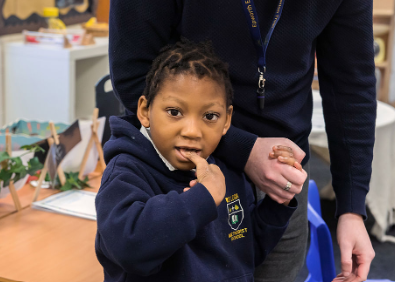
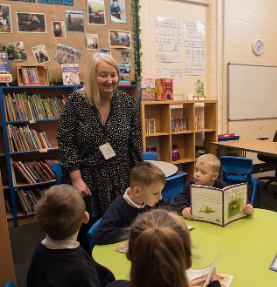
Child protection is part of safeguarding and refers to school taking action to protect specific children who are suffering, or are likely to suffer, significant harm. School has a crucial role in noticing indicators of possible abuse or neglect and referring them to Children's Services.
School is committed to the continuous development of staff with regard to safeguarding.
- Staff have annual training
- Children are also supported in recognising risks in different situations including cyberbullying and on-line safety
- There is a zero-tolerance approach to bullying and child-on-child abuse
- School operates safe recruitment practices including appropriate Disclosure and Barring Service (DBS) and reference checks, verifying identity and qualifications, right to work in England checks and checking the Children's Barred List. School carries out on-line searches as part of due diligence checks on shortlisted candidates.
- Volunteers also go through rigorous checks. They must have an interview with the headteacher, have a DBS check, reference check and full induction prior to supporting school
- Visitors to school must sign in formally at the main school office, are not left unattended in school and wear a lanyard at all times
- We support staff / volunteer / visitor confidence to report misconduct to adults
- Risk assessments cover the school environment such as safety in classrooms, on the playground and supervision procedures. Risk Assessments also cover off-site educational visits.
Please contact the school directly if you have a concern about the welfare of a child and speak to one of our Designated Safeguarding Leads (DSLs).
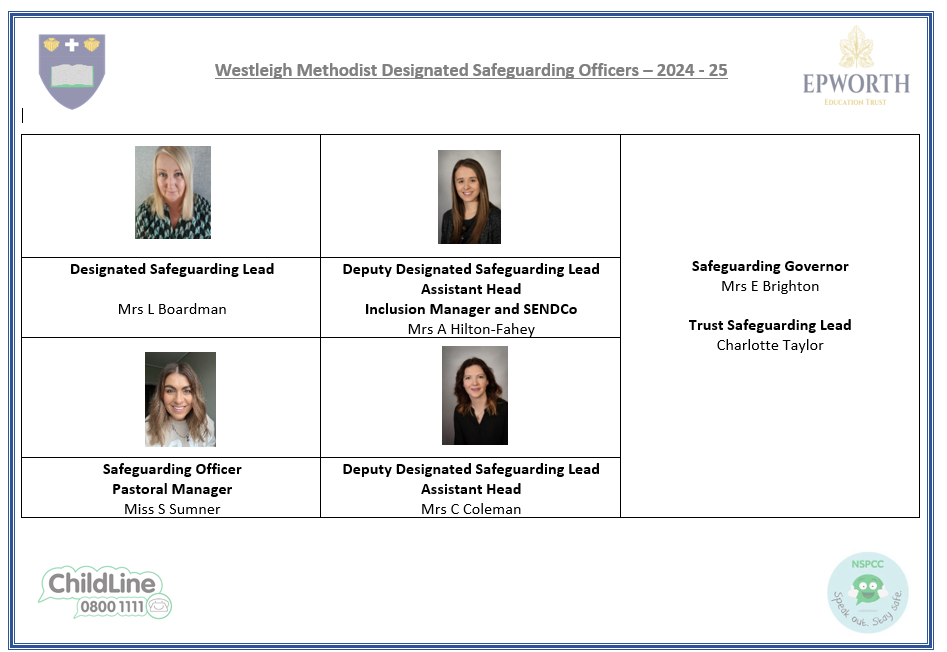
Safeguarding leaflets for families can be collected from the office and are displayed in the school's entrance foyer.
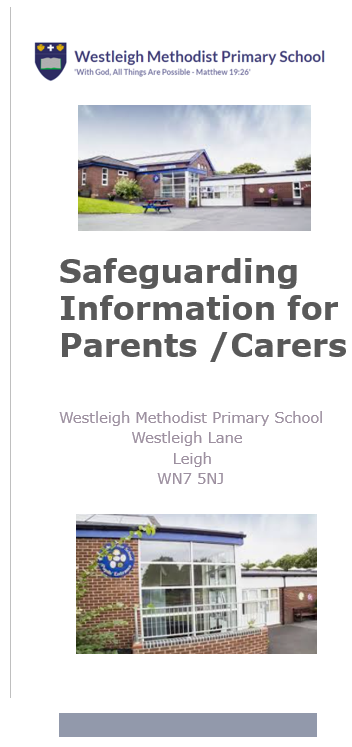
Designated Safeguarding lead:
Mrs Boardman (Headteacher)
Deputy Safeguarding Leads:
Mrs Taylor (Deputy Headteacher)
Safeguarding Officers:
Samantha Sumner (Pastoral Manager) Mrs Hilton-Fahey (SENDCo)
Mrs Coleman (Year 6 teacher, Maths Lead)
Trust Lead: Mrs Burkes (Trust Safeguarding Lead)
Governor Lead: Mrs E Brighton
Trustee Lead: Charlotte Taylor
Further advice can be sought via the following:
Children’s Duty Team: 01942 828300
Professionals referral form can be found on the wigan.gov website under Children’s Health and Social Care
Local Authority Designated Officer (LADO): Heather Martin
LADO telephone number: 01942 486042
LADO email: lado@wigan.gov.uk
Parents advice and support
The government have released some updated guidance on safeguarding.
This guidance brings together sources of information about the main risks children may be particularly vulnerable to during the coronavirus (COVID-19) pandemic and signposts you to help and support available.
The essential measures to control coronavirus can potentially increase risks to children and this can cause concern for parents and carers.
This guide also includes information on the support providers who can help you have effective conversations with a young person, especially if you are concerned for their safety. Please use the link below to access this guidance:
https://www.gov.uk/advice-to-parents-and-carers-on-keeping-children-safe-from-abuse-and-harm
Wigan's Safeguarding Children Board have produced a helpful website that offers advice and support for parents if they are concerned for a child's welfare. This can be from bullying and abuse to internet safety. If you have a concern about a child's welfare please use the following link to gain the information that you need:
http://www.wiganlscb.com/Parent/Index.aspx
Lots of practical resources to support a wide range of concerns including:
- Tackling Sleep Problems in Children and Teens
- Supporting Your Child Through School Anxiety
- Improving School Attendance
- Child Mental Health & Wellbeing
- Parental Mental Health & Wellbeing
These can be accessed via: Parental Resources | SSS Learning
Drop off/collection by an older sibling
There is no minimum age set in law when a young person is allowed to remain in charge of another child but it is an offence to leave a child alone if it places them at risk. This can include in the care of an older sibling if the level of supervision is ‘likely to cause unnecessary suffering or injury to health’ (Children and Young Persons Act, 1933). Parents/carers are therefore responsible for anything that should go wrong in their absence. The Royal Society for the Prevention of Accidents (ROSPA) and the NSPCC do not advise for someone under the age of 16 to look after young children.
If the school has any concern that older siblings are not competent to take younger siblings to and from school or there are concerns about any child’s safety or welfare due to these arrangements, this will be raised with the parent (ideally in advance of collection) and if alternative arrangements are not made, a safeguarding referral may be made to Children’s Services where necessary.
School policy for children to be collected by an older sibling:
• Children in the Early Years (Nursery and Reception) and KS1 (Y1 and Y2) must not be collected by anyone under the age of 18.
• Children in Y3 to Y6 must not be collected by anyone below the age of 14.
Operation Encompass
Operation Encompass is a new initiative which will endeavour to provide support for children and young people who have experienced domestic abuse in their household. It is a partnership between the Multi-Agency Safeguarding Hub (MASH), Wigan Safeguarding Children’s Board and designated school staff, known as Key Adults. The MASH team will inform Key Adults within schools about any domestic abuse incident where the child has been present or affected. This will enable schools to take appropriate steps to support our pupils during what could be an emotionally difficult time. We are hoping to have this up and running before the end of the Autumn Term.

Online Safety
The main reason that we provide internet access to our teachers and pupils is to promote educational excellence by facilitating resource sharing, innovation and communication. Internet access will be authorised once parents and pupils have returned the signed consent form as part of the Acceptable Use Policy. A record will be kept by the Headteacher of all pupils who have been granted internet access.
All users in Year 2 and above will be provided with usernames and passwords, and are advised to keep this confidential to avoid any other pupils using their login details. Pupils’ passwords are set and their activity is continuously monitored by the Pastoral Manager and the schools’ Senso Safegaurding system and online filtering is in place via Sophos XG Fire Wall. Sophos XG Firewall ensures that when children are online content is filtered to ensure they are safe when browsing.
Management systems are in place to allow teachers and members of staff to control workstations and monitor pupils’ activity. Senso is used to support schools in this. Senso is used to address e-safety and monitor the safe use of computers, on and offline. This helps to identify safeguarding risks from the words that are typed, even if not saved in documents. This is to help address worries that children may have by; letting them confide anonymously, resolve bullying issues, detect issues that children may be of concern to a safeguarding officer.
All school systems will be protected by up-to-date virus software. Sophos provides online security for schools in the Trust. Sophos guards the schools’ internet connections from threats that are posed to internet users and the network infrastructure. This helps to prevent hacking of systems and data and a wide range of malware, viruses etc. This also helps to restrict access to inappropriate web-content.
Find out more about how children use social media; the apps they use; potential risks they face; using privacy settings and advice and tips on how to talk to your children about e-safety.
There is a lot of support available to keep children safe online. Below are some useful links to help parents and carers:
- Report and Remove Report Remove is here to help young people under 18 in the UK to confidentially report sexual images and videos of themselves and remove them from the internet.Report Remove | Childline
- Report Harmful Content (report Harmful Content can help you to report harmful content online by providing up to date information on community standards and direct links to the correct reporting facilities across multiple platforms) Report Harmful Content - We Help You Remove Content
- Child Exploitation and Online Protection Report online sexual abuse or the way someone has been communicating with your child online CEOP Safety Centre
- Thinkyouknow (advice from the National Crime Agency to stay safe online)
https://www.thinkuknow.co.uk/ - Internet Matters (support for parents and carers to keep their children safe online)
https://www.internetmatters.org/ - Parent info (support for parents and carers to keep their children safe online)
https://parentinfo.org/ - Net-aware (support for parents and carers from the NSPCC)
https://www.net-aware.org.uk/ - Childnet (support for parents and carers to keep their children safe online)
https://www.childnet.com/ - NSPCC (additional information for parent and carers including setting up parental controls)
https://www.nspcc.org.uk/keeping-children-safe/online-safety/
Our Weekly Newsletter
Each week, our newsletter contains a dedicated section on safeguarding. Recently, we have concentrated on on-line safety...especially with it being On-line Safety Day in February. Here is an extract from 14th February and the parental guidance from Childnet is attached below.
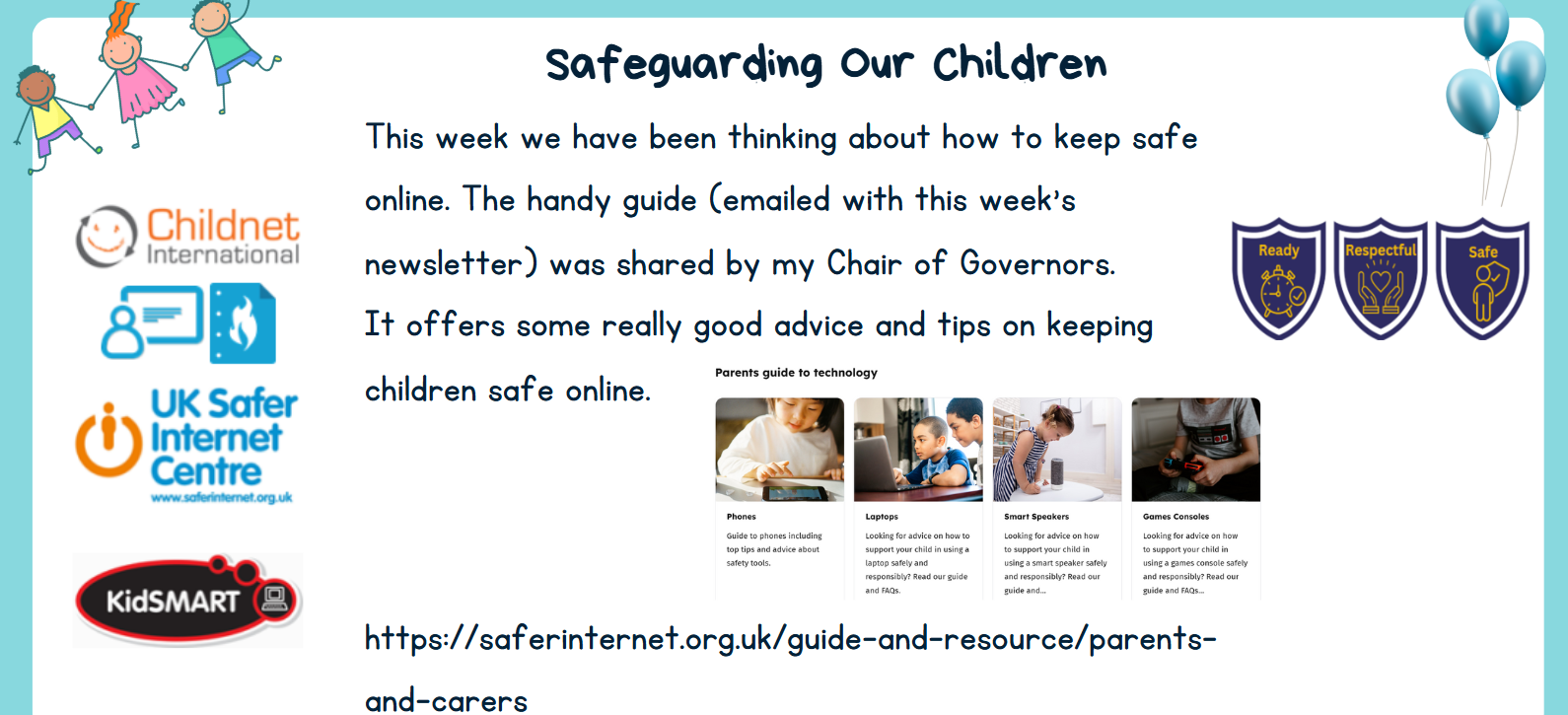
Safer Internet Day - Tuesday 11th February 2025
We continually work on key messages from Safer Internet Day.
Around Safer Internet Day, we ran a poster competition to promote this important learning. The children engaged in activities in class throughout the week to raise awareness. Miss O’Connor, our Computing Lead, is happy to answer any questions or support worries at home around this.
Our internet safety competition winners were Aydin and Essa from Year 1 who worked so hard at home making their 3D posters. They really looked into how to keep safe online and were able to tell the whole class how to do this.
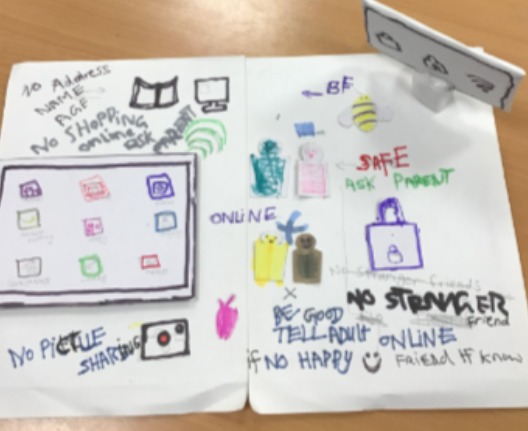
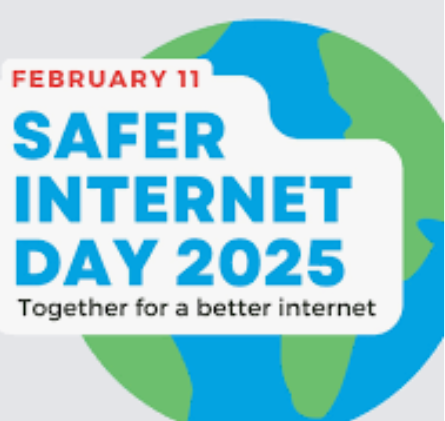
Further documents and policies to support Safeguarding within our school can be found attached below:
